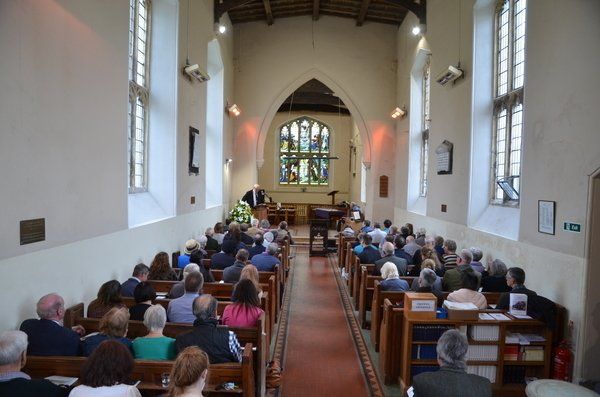
How do you think of your church? What is it you are committed to, in your heart and mind?
It is surprising how many different answers there can be to such questions as these, even in one small Evangelical church!
Here I want to consider just three of these answers — and show why only one is the biblical response.
Particular place
First, there are people who, when you mention the church, instinctively think of the building. Their ultimate commitment is to worshipping in a particular place.
They will, if necessary, endure preaching, forms of worship, and church decisions with which they disagree. They will do so year upon year, taking their seat (usually the same one!) on Sundays, although probably only once each week.
They will ‘go to their church’ as they have always done, come what may.

When it is pointed out to them that the Bible contains no mention of a church building, and that their view of the church is wrong, their ears and minds seem completely closed. Are they believers at all?
Activities
However, many who would disagree strongly with such an approach, and of whose devotion to Christ there can be no doubt, still have a sub-biblical view of the local church.
To them, the church is primarily defined by its activities. They rightly have definite views about what should be preached; about the form of worship; about how we should evangelise; and many other things that a church may do.
They are involved, as far as they are able, in church activities. But this is as far as their thinking goes.
So if a church ceases to ‘do’ enough of these things in a way that pleases them, they are likely to ‘up sticks’.
They will decamp to somewhere that scores higher on their personal list of desiderata — what they think a church should be doing and how it is done.

Leaving a church
Of course, there are times when Christians have to leave a church. If heresy is preached or immorality tolerated; if reverence is removed and God’s interests are subordinated to man’s; if biblical principles are replaced by human pragmatism.
In such cases, when humble, reasoned protest fails, withdrawal may be the only option.
But I have begun to ask a question when anyone leaves our church: ‘Are you saying we should all leave?’ The answer is always ‘No!’
So then, the withdrawal is not over a matter of principle but of practice. And that makes it schism.
The view that one can be justified in leaving a church, when others are justified in staying, can only arise where the church is defined principally in terms of what it does.
This is not a biblical view of the local church.
People
How much are we told in the New Testament about what any church did? We read about their giving, their effective witness, and their support of others. But we read little of evangelistic programmes, special meetings, Sunday schools, or Bible rallies.
That is not to say that there is anything wrong with such things. It simply means that a church is not defined by its activities.
A church which meets only for worship and does nothing else is still a biblical church (providing its members bear witness to Christ in their daily lives). Many ‘Reformed’ churches are tinged with practical Arminianism over this question of activities!
No; God defines a church in terms of people. The church is the people of God, joined one with another because they are one with him.
They have fellowship with one another because they have ‘fellowship with the Father and with his Son Jesus Christ’ (1 John 1:3).

The whole church of Christ is his body; but so is the local church (1 Corinthians 12:12,27). Both are equally the temple in which he lives by his Spirit (Ephesians 2:21-22).
One body
So when someone joins a church, the first question we should ask is not: ‘Are you committed to worshipping in this building?’ Nor should it be: ‘Are you committed to the activities of this church (including its worship)?’
Rather, we should ask: ‘Are you committed to these people? Will you love them, and remain faithful to them?’
It needs to be spelt out, of course, that this commitment will be expressed in worshipping and (possibly) working with them — but this is the fruit not the root.
The commitment also involves submission to the leaders of the church, and financial support according to one’s ability — but these are not the primary promises to be made, either.
‘Is this your church?’ must mean: ‘Are these your people?’
Loving, not leaving
This teaching should be constantly reaffirmed. Pastors must emphasise love to one another, and what this means in practice, including forbearance and counting each other better than ourselves.
Then, when the stresses and disagreements come, a resolution can be sought within this context.
If activities are lessened in importance in our minds, while love grows in our hearts, we shall be much less likely to think of deserting our fellow-believers — let alone do so.







